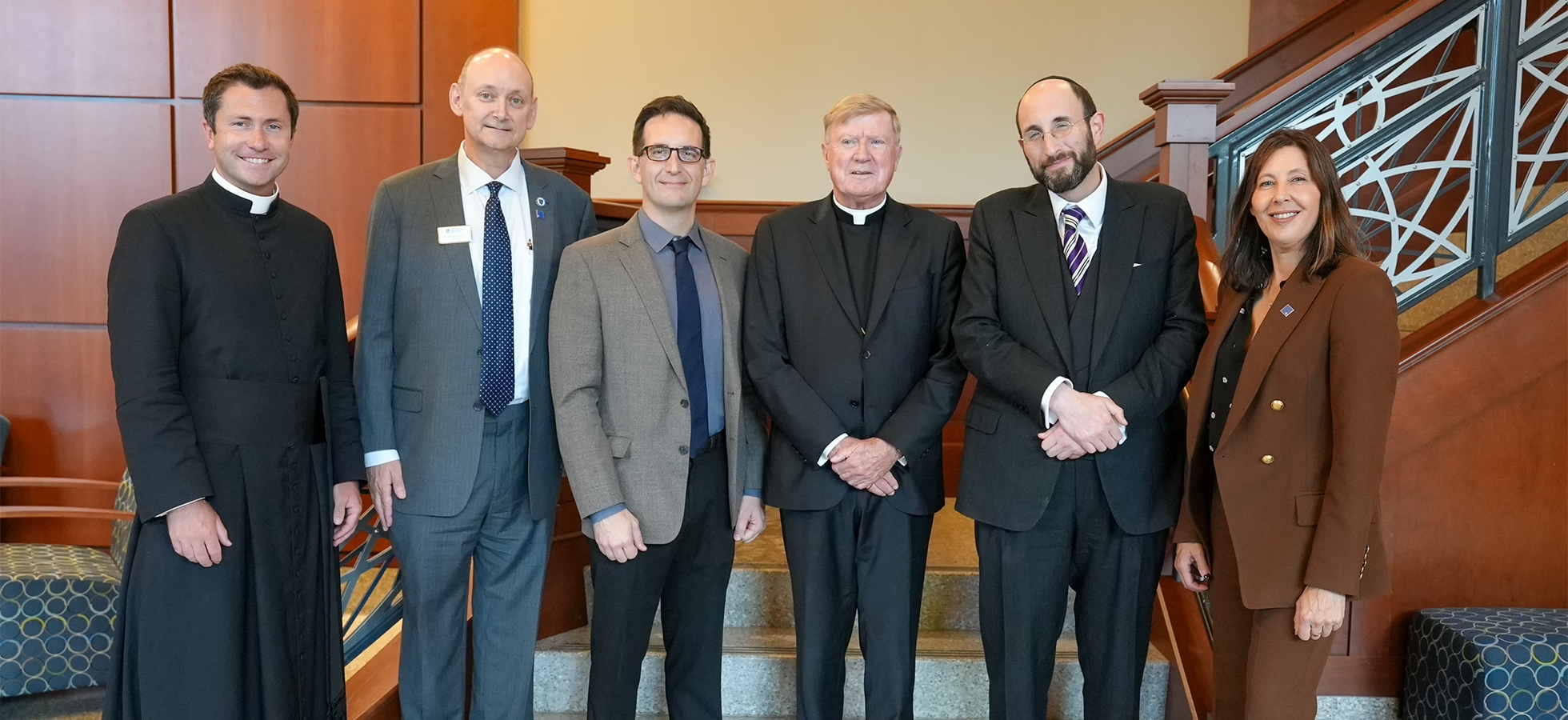Rabbi Klein Lecture Draws National Experts to Speak on Catholic-Jewish Friendship

On September 30, Assumption University hosted the annual Rabbi Joseph Klein Lecture, sponsored by Assumption’s Center for Civic Friendship and the Jewish Federation of Central Massachusetts (JFCM). This year’s lecture saw Rabbi Meir Soloveichik and Dr. Matthew Tapie reflect on the Vatican II document that redefined the Catholic Church’s approach to interfaith dialogue, Nostra Aetate.
Soloveichik is the Senior Rabbi of Congregation Shearith Israel in Manhattan—the oldest Jewish congregation in the United States—and Director of the Straus Center for Torah and Western Thought at Yeshiva University. Tapie is an Associate Professor of Theology and Director of the Center for Catholic-Jewish Studies at Saint Leo University in Florida.
Assumption President Greg Weiner opened the lecture by contextualizing the Rabbi Klein lecture’s institutional significance and history as reflected in the examination of Nostra Aetate. “When we think of interfaith dialogue, we often think of overlooking differences—but only those who take their religious commitments seriously can converse productively with people who are serious about their differing commitments in turn.”
In her opening remarks, Mary Jane Rein, director of the Center for Civic Friendship, continued that theme. “Over the past 60 years, Nostra Aetate has transformed Catholic-Jewish relations, and its success represents one of the most remarkable examples of reconciliation in modern history. Tonight’s conversation embodies the mission of our center, exploring how genuine relationships across differences can strengthen both our particular communities and our shared civic life. This is precisely the kind of productive dialogue our democracy needs—one that seeks common ground for the common good.”
“Assumption University, under the leadership of President Greg Weiner, is uniquely positioned to host this vital conversation, and we do so in partnership with the Jewish Federation of Central Massachusetts. I’m grateful to its director, Steven Schimmel, and President Joel Baker for their presence here, along with many others from the Jewish community. And shout out to all of you from Beth Israel and from Temple Emmanuel Sinai—thanks again for being here right on this very critical moment in the Jewish calendar. Some no doubt remember Rabbi Joseph Klein, the namesake of this annual lecture series and the longest serving rabbi of Temple Emmanuel, now Emmanuel Sinai, in Worcester. I also want to recognize Bishop McManus and my many Catholic friends who’ve joined us to reflect on how different faith traditions can not only coexist, but can enrich one another through authentic engagements and mutual respect.”
Tapie first addressed the audience regarding three key teachings in Nostra Aetate. First, the Church’s firm opposition to any form of anti-Semitic collective guilt charge resulting in God’s rejection of the Jewish people. Second, that the Jewish people remain God’s chosen. And third, that Catholics are called to a virtuous dialogue with Jews and Judaism with the aim of building mutual understanding. He encouraged Catholics in the audience to study Judaism, study the Holocaust, and sensitively approach the Israeli Palestinian conflict.
“Let us follow Christ on this path of dialogue today,” he said. “The Jewish people should be viewed as dialogue partners—that is, if our neighbors are open to such conversations, and we must certainly respect them and give them space if they prefer not to be. As Pope Francis said, dialogue with the Jewish people is part of the life of Jesus’ disciples.”
Soloveichik then spoke about the 1965 essay “The Lonely Man of Faith,” written by his great uncle Rabbi Joseph Soloveitchik. In the essay, Soloveitchik argued that if people of faith are lonely, it is because they are part of two distinct cultural communities—one technocratic, and one covenantal—something to which both Catholics and Jewish people could relate.
“My great uncle’s thesis remains that even when society rejects us, we cannot give up on society. We cannot amputate our religious identity from our very selves,” said Soloveichik. “It was important for him that Jews and Christians engage each other about the challenges that face them as communities of faith in the larger, ever-secular world—and that’s especially important today. The challenge of modern technology should be one of the most enriching and important aspects of the Jewish-Christian engagement. And if our two communities can work together to address it, this will be an endeavor worthy of being remembered.”
Father Michael Hoye ’16 delivered the alumni response to the lecture, reflecting on his time in Rome studying theology and how his connections to Salisbury Street spread halfway across the world.
“One day, a visiting professor recognized some commonality between us. She asked where I was from, and with my thickest accent, said, ‘I’m from Worcester.’ She said she was from New Bedford. We had to travel all the way to Rome to encounter each other. Later, she asked the class, ‘who here has read Nostra Aetate? I think I was the only one to raise my hand. And I thank Assumption, specifically Professor Marc LePain for having me read that when I was an undergraduate here.”
Invited by Fr. Hoye, Rabbi Soloveichik ended the lecture by praying, “Almighty G-d, your servant David sang in his song: הִנֵּ֤ה מַה־טּוֹב֙ וּמַה־נָּעִ֔ים שֶׁ֖בֶת אַחִ֣ים גַּם־יָֽחַד (Hinei mah tov u’mah na’im shevet achim gam yachad) / Behold how goodly and pleasant it is when brethren dwell together in unity. We thank you G-d for the gift of this evening that allows all of us, brothers and sisters in faith, gathered together to celebrate what we have in common without denying our differences. Help us to further foster connections between us and between all Americans of faith so that we can work for the country’s future, so that what was said by David in the conclusion of his song can be said of us as well: כִּי שָׁם צִוָּה יְהֹוָה אֶת-הַבְּרָכָה חַיִּים עַד-הָעוֹלָם (Ki sham tzivah Adonai et-hab’rachah chayim ad-ha’olam)/ For there G-d has placed His blessing, a source of life everlasting.”
